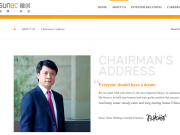United States Public Company Accounting Oversight Board Fines PwC $2.75 Million for Failure to Maintain Independence by Consulting with Independent Office Prior to Discussion with Audit Clients, PwC Provides Consulting & Advisory Services that Can be in Conflicts of Interest with Audit Business
11th April 2024 | Hong Kong
The United States Public Company Accounting Oversight Board (PCAOB) has fined PwC $2.75 million for failure to maintain independence by consulting with PwC Independent Office prior to discussion with audit clients, with PwC providing consulting & advisory services that can be in conflicts of interest with the audit business. PCAOB: “These deficiencies came to light in 2018, when numerous PwC leaders and partners failed to consult with PwC’s Independence Office or conduct other appropriate independence analysis as PwC explored the possibility of terminating its audit relationship with an issuer client to allow for a joint business relationship (JBR) with the client. PwC did not raise the JBR‑related discussions to its Independence Office – or perform an appropriate analysis of PwC’s independence in light of those discussions – until PCAOB investigators raised questions about PwC’s independence from the issuer. The PCAOB further found that, in 2018, members of PwC’s Tax group prepared and shared with members of PwC’s Assurance group a “business case” document showing that PwC could generate substantially more revenue from a JBR with the issuer than it was earning as the issuer’s auditor. In response to that business case document and at the instruction of one of PwC’s national leaders for Assurance, two PwC partners – including the engagement partner for the issuer’s then‐ongoing 2018 integrated audit – met with the issuer’s CEO and the issuer’s President in November 2018 and discussed, among other things, business opportunities that PwC and the issuer could pursue in a JBR. Both during and after the meeting, the issuer’s CEO expressed enthusiasm for a JBR with PwC, which the CEO understood might be worth tens of millions of dollars to the issuer. Shortly after the November meeting, PwC and the issuer began exploring the possibility of transitioning the audit to another auditor. At the same time, however, PwC planned to continue performing the audit of the issuer’s December 31, 2018, financial statements and to also perform the next quarterly review. PwC’s then‐existing independence policies and procedures did not require an Independence Office consultation in these circumstances. PwC’s Independence Office was informed of the November meeting and related discussions only after the PCAOB’s Division of Enforcement and Investigations sent PwC a document and information request concerning PwC’s independence from the issuer. That PCAOB request caused PwC to initiate a consultation with its Independence Office. The Independence Office then considered the above circumstances, alongside PwC’s other non‐audit interactions with and involving the issuer and determined that there was a risk that a reasonable investor could conclude that PwC was not independent of the issuer in 2018. PwC was thereafter terminated as the issuer’s auditor, prior to completing the 2018 audit.”
“ United States Public Company Accounting Oversight Board Fines PwC $2.75 Million for Failure to Maintain Independence by Consulting with Independent Office Prior to Discussion with Audit Clients, PwC Provides Consulting & Advisory Services that Can be in Conflicts of Interest with Audit Business “
PCAOB Chair Erica Y. Williams: “Auditor independence is essential to maintaining trust in our capital market system. Firms must have effective guardrails in place to enforce independence and uphold the integrity of their audits.”
Robert E. Rice, Director of the PCAOB’s Division of Enforcement and Investigations: “A critical component of a well-functioning system of quality control are policies and procedures that provide reasonable assurance that personnel will refer to authoritative literature or other sources and consult, on a timely basis, when appropriate. If a firm does not appropriately design and maintain such policies and procedures, or does not adequately communicate them, we will not hesitate to hold the firm accountable for that failure.”
United States Public Company Accounting Oversight Board Fines PwC $2.75 Million for Failure to Maintain Independence by Consulting with Independent Office Prior to Discussion with Audit Clients, PwC Provides Consulting & Advisory Services that Can be in Conflicts of Interest with Audit Business

28th March 2024 – The Public Company Accounting Oversight Board (PCAOB) today announced a settled disciplinary order (PDF) sanctioning U.S.-based PricewaterhouseCoopers LLP (“PwC” or the “firm”) for violations of PCAOB quality control standards relating to the maintenance of auditor independence. The PCAOB found that PwC’s quality control policies and procedures were deficient because they did not provide reasonable assurance that the firm’s personnel would timely consult with qualified individuals or refer to authoritative literature or other sources when dealing with certain complex, unusual, or unfamiliar independence issues.
- These deficiencies came to light in 2018, when numerous PwC leaders and partners failed to consult with PwC’s Independence Office or conduct other appropriate independence analysis as PwC explored the possibility of terminating its audit relationship with an issuer client to allow for a joint business relationship (JBR) with the client. PwC did not raise the JBR‑related discussions to its Independence Office – or perform an appropriate analysis of PwC’s independence in light of those discussions – until PCAOB investigators raised questions about PwC’s independence from the issuer.
- The PCAOB further found that, in 2018, members of PwC’s Tax group prepared and shared with members of PwC’s Assurance group a “business case” document showing that PwC could generate substantially more revenue from a JBR with the issuer than it was earning as the issuer’s auditor. In response to that business case document and at the instruction of one of PwC’s national leaders for Assurance, two PwC partners – including the engagement partner for the issuer’s then‐ongoing 2018 integrated audit – met with the issuer’s CEO and the issuer’s President in November 2018 and discussed, among other things, business opportunities that PwC and the issuer could pursue in a JBR. Both during and after the meeting, the issuer’s CEO expressed enthusiasm for a JBR with PwC, which the CEO understood might be worth tens of millions of dollars to the issuer.
- Shortly after the November meeting, PwC and the issuer began exploring the possibility of transitioning the audit to another auditor. At the same time, however, PwC planned to continue performing the audit of the issuer’s December 31, 2018, financial statements and to also perform the next quarterly review. PwC’s then‐existing independence policies and procedures did not require an Independence Office consultation in these circumstances.
- PwC’s Independence Office was informed of the November meeting and related discussions only after the PCAOB’s Division of Enforcement and Investigations sent PwC a document and information request concerning PwC’s independence from the issuer. That PCAOB request caused PwC to initiate a consultation with its Independence Office. The Independence Office then considered the above circumstances, alongside PwC’s other non‐audit interactions with and involving the issuer and determined that there was a risk that a reasonable investor could conclude that PwC was not independent of the issuer in 2018. PwC was thereafter terminated as the issuer’s auditor, prior to completing the 2018 audit.
Without admitting or denying the Board’s findings, PwC consented to the PCAOB’s order against the firm. The order censures the firm, imposes a $2.75 million civil money penalty on the firm, and requires the firm to complete remedial undertakings. Those remedial undertakings require that the firm:
- Review and revise or supplement, as necessary, its independence‐related quality control policies and procedures;
- Make certain communications to the firm’s professionals regarding certain independence rules and standards, and related firm quality control policies and procedures; and
- Ensure that all current firm professionals, and all professionals hired in the next five years, complete four additional hours of professional training related to certain independence rules and standards, and related firm quality control policies and procedures.
PCAOB staff members Joshua M. Cutler, Michael Rosenberg, Tony Mealey, Khristoph Becker, and K Lynn Dunston conducted the investigation, which was supervised by William Ryan and John Abell. The PCAOB thanks the Securities and Exchange Commission for its assistance in this matter.
The PCAOB oversees auditors’ compliance with the Sarbanes-Oxley Act, provisions of the securities laws relating to auditing, professional standards, and PCAOB and SEC rules. Further information about the PCAOB Division of Enforcement and Investigations is available on the PCAOB website. Firms or individuals wishing to report suspected misconduct by auditors, or to self-report possible misconduct, may visit the PCAOB Tips and Referrals page.
About the PCAOB
The PCAOB is a nonprofit corporation established by Congress to oversee the audits of public companies in order to protect investors and further the public interest in the preparation of informative, accurate, and independent audit reports. The PCAOB also oversees the audits of brokers and dealers registered with the Securities and Exchange Commission, including compliance reports filed pursuant to federal securities laws.
Sign Up / Register
Caproasia Users
- Manage $20 million to $3 billion of assets
- Invest $3 million to $300 million
- Advise institutions, billionaires, UHNWs & HNWs
Caproasia Platforms | 11,000 Investors & Advisors
- Caproasia.com
- Caproasia Access
- Caproasia Events
- The Financial Centre | Find Services
- Membership
- Family Office Circle
- Professional Investor Circle
- Investor Relations Network
Monthly Roundtable & Networking
Family Office Programs
The 2025 Investment Day
- March - Hong Kong
- March - Singapore
- July - Hong Kong
- July - Singapore
- Sept- Hong Kong
- Sept - Singapore
- Oct- Hong Kong
- Nov - Singapore
- Visit: The Investment Day | Register: Click here
Caproasia Summits
- The Institutional Investor Summit
- The Investment / Alternatives Summit
- The Private Wealth Summit
- The Family Office Summit
- The CEO & Entrepreneur Summit
- The Capital Markets Summit
- The ESG / Sustainable Investment Summit







































